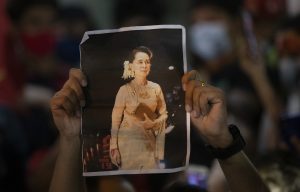On the morning of February 1, the news broke that Myanmar’s State Counsellor Aung San Suu Kyi and other leaders of her National League for Democracy (NLD) party had been detained by Myanmar’s military. The military announced that it had seized control of the country, declaring a state of emergency and appointing General (AP Photo/Sakchai Lalit), first vice president under the Suu Kyi administration, as acting president.
Myanmar’s military (known as the Tatmadaw) was shocked by the landslide victory won by the ruling NLD party in the general election last year, and is believed to have been worried that its power would be undermined. The Tatmadaw claims irregularities in the election and says it will hold another election under the control of the nation’s armed forces.
Clearly, this blatantly tramples all over the country’s fledgling democracy. Moreover, the detention of Aung San Suu Kyi and other prominent members of the NLD are serious human rights violations.
Sadly, disregard for democracy and human rights has become a trend in Southeast Asia in recent years. Myanmar had already been under fire for its abysmal human rights record with the Rohingya. Aung San Suu Kyi’s inability to deal successfully with the issue and her reluctance to defend the rights of the Rohingya out of concern for domestic public opinion had severely tarnished her international reputation. Still, during the past decade, Myanmar should have put the previous era of the military junta behind it and been on the path to democratization, firstly under the Thein Sein administration following the transfer of power to a civilian government in 2011, and then under Aung San Suu Kyi and the NLD when it came to power after winning the general election.
In neighboring Thailand, the Prayuth-led military regime that emerged from the 2014 coup d’état crushed the rival Thaksin faction’s major political party and went on to win the 2019 general election, further cementing its power. In Cambodia, Hun Sen retained his more than 30 years’ hold on power in the 2018 general election after crushing rival parties and scrapping English-language newspapers critical of the government. Myanmar was believed to be clearly distinct from these countries, yet it too has followed this path of erasing progress on democracy.
The coup is of course a domestic political issue. However, the growing power of authoritarian regimes in Myanmar’s Southeast Asian neighbors would have had the effect of lowering psychological resistance to the execution of a coup. Further, while strong condemnation from advanced Western democratic nations was to be expected, Myanmar’s military would have been encouraged by the expectation that China, with its rapidly expanding influence and its own disregard for democracy, would not respond overly troubled.
From this perspective, the impact of the coup will not be confined to Myanmar. Not only is it casting an enormous shadow over the future of democracy in Southeast Asia, but it represents yet another challenge to the existing international order, in which democracy and human rights had been gaining legitimacy.
In response to the situation in Myanmar, ASEAN immediately issued a Chairman’s statement. The wording “We encourage the pursuance of dialogue, reconciliation and the return to normalcy in accordance with the will and interests of the people of Myanmar” is a recognition that ASEAN must respect Myanmar’s sovereignty and it is unable to intervene in any significant way. Yet the Chairman’s statement does include wording that affirms the objectives and principles set forth in the ASEAN Charter, including democracy, the rule of law and good governance. The official stance of ASEAN has changed dramatically from a decade or so ago, when it had very little to say on democracy and human rights issues.
That is why the contradictions now inherent within ASEAN come into sharp relief when a situation such as this arises that runs blatantly counter to some of the bloc’s objectives.
OBA Mie is a professor at the Graduate School of Law, Kanagawa University.

































